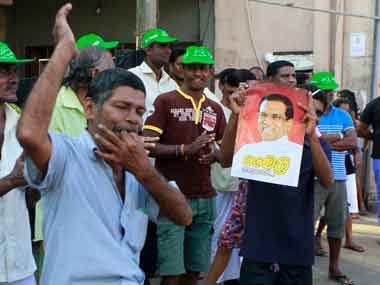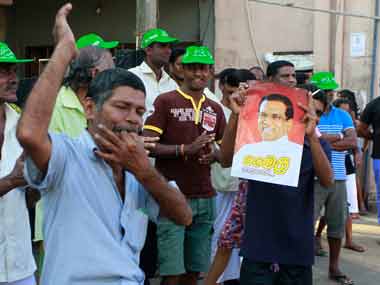Sri Lankan president Mahinda Rajapaska’s defeat by last-minute defector Maithripala Sirisena is unlikely to change the Sinhala-Buddhist domination of the island nation’s politics, but it will go down in history as the revenge of the minorities. The outrage against the family rule of Rajapaksa had certainly estranged even the Sinhala-Buddhist majority, but what has apparently done him in are the Tamil and Muslim minorities which form about 30 percent of the country’s population. After the defeat of the LTTE and marginalisation of the Tamils in the north, the Rajapaksas had overtly encouraged the Sinhala-Buddhists to target Muslims, and even Christians, in a bid to further polarise the country’s electorate. Ironically this polarisation has killed him. Things would have gone perfectly his way, had the new President elect Maithripala Sirisena not jumped ship at the last minute. He sensed the outrage among the common people against the misrule of the Rajapaksa family, which had converted Sri Lanka’s government into a well-entrenched family enterprise, and took away the latter’s Sinhalese constituency with him. Mahinda wouldn’t have expected the polarisation of the very constituency that he had assiduously built for himself through blatant appeasement. [caption id=“attachment_2038159” align=“alignleft” width=“380”]
 Supporters of Sirisena during the election campaign. AP image[/caption] The Tamils and the Tamil National Alliance, which supported Sirisena, can be happy that they have at least partly, and peacefully, avenged the mass killing of 2009. The Muslims can feel safer without the Rajapaksas because it was the latter’s support that emboldened the right wing Bodu Bala Sena to unleash hate-crimes against them. However, will the change of presidency change their social marginalisation? Unlikely, because Sirisena comes from he same political stock of Sinhala-Buddhists. There is nothing to indicate that his politics is different from that of Rajapaksa and there is nothing encouraging about his stand vis-a-vis the Tamils. Will he give more autonomy to the TNA-ruled northern province? No. Will he initiate a credible investigation into the alleged war crimes by the Rajapksa regime? No. Will he demilitarise the Tamil areas? No. In all likelihood, it will be status quo. Although it’s the minorities who tipped the balance is his favour, Sirisena will be mindful of his principal constituency and hence will not change the basic matrix of Mahinda’s politics - i.e. to keep the Sinhala-Buddhist bloc in good humour. That itself will prevent him from doing anything good for the Tamils. What seems to have changed is not the politics, but the regime and the style. The Rajapaksas had become too authoritarian and family-centric, which people resented like in any democratic country. Perhaps there won’t be any more impeachment of the Supreme Court judges and summary killings of opponents. But, is it really a vote for change? Yes it is, but with a limited scope of possibilities. The majority would perhaps expect a more democratic Rajapaksa in Sirisena, who can continue the former’s war-triumphalism and majoritarian politics. However, what can make things better for the Tamils is the composite nature of the opposition. It’s a broad alliance and not a party with brute power and these chinks should keep Sirisena in check. Moreover, if he sticks to his promise of bringing the country back to a parliamentary democracy within 100 days of his assuming office, it will be, at least psychologically, a promising move. The changing of the guard in Colombo should be an opportunity that the international community should utilise to push for a credible investigation into the alleged war crimes against Tamils. Sirisena had repeated what Mahinda had promised in his election campaigns - that he won’t permit anybody to be prosecuted. The rest of the world and the UN should still push for it. When the Muslims came under attack by Sinhalese monks and their men in 2013, it was the US Ambassador to Sri Lanka who raised a voice of protest. As far as India is concerned, the change is an opportunity to push for the devolution of power to Tamils under 13th amendment and demilitarisation of the Tamil areas. Besides genuine autonomy, the Northern Provincial Council (NPC) needs generous central funds and acknowledgement by Colombo that Tamils can indeed decide for themselves on most things that concern them other than strategic issues that affect the country as a whole such as finance and defence - exactly the way it works in India. Colombo has to reconcile to the fact that federalism in such socio-cultural settings is possible and is unavoidable. Immediately after the provincial elections, the chief minister of NPC, CV Wigneswaran had said: “It was time for the Sinhalese and the Tamils to live together in peace. We are citizens of the same country.” Regarding the larger question of geo-politics that concern India, it’s unlikely that Sirisena will majorly retract from Mahinda’s pro-China policy because the latter has made irreversible inroads into the island’s strategic and economic spaces although the opposition leader Ranil Wickremesinghe said he would stop the construction of a US $ 1.5 billion port by the Chinese. Sirisena’s inexplicit resentment of the Chinese seems to stem from the Rajapksas’ vested interests and his promise for equal relations with India, China, Pakistan and Japan is just a minor consolation. As for Sri Lankans, the change offers hope for better human rights standards, democratic governance and an end to state-sponsored terror, torture, disappearances and large-scale corruption.
Supporters of Sirisena during the election campaign. AP image[/caption] The Tamils and the Tamil National Alliance, which supported Sirisena, can be happy that they have at least partly, and peacefully, avenged the mass killing of 2009. The Muslims can feel safer without the Rajapaksas because it was the latter’s support that emboldened the right wing Bodu Bala Sena to unleash hate-crimes against them. However, will the change of presidency change their social marginalisation? Unlikely, because Sirisena comes from he same political stock of Sinhala-Buddhists. There is nothing to indicate that his politics is different from that of Rajapaksa and there is nothing encouraging about his stand vis-a-vis the Tamils. Will he give more autonomy to the TNA-ruled northern province? No. Will he initiate a credible investigation into the alleged war crimes by the Rajapksa regime? No. Will he demilitarise the Tamil areas? No. In all likelihood, it will be status quo. Although it’s the minorities who tipped the balance is his favour, Sirisena will be mindful of his principal constituency and hence will not change the basic matrix of Mahinda’s politics - i.e. to keep the Sinhala-Buddhist bloc in good humour. That itself will prevent him from doing anything good for the Tamils. What seems to have changed is not the politics, but the regime and the style. The Rajapaksas had become too authoritarian and family-centric, which people resented like in any democratic country. Perhaps there won’t be any more impeachment of the Supreme Court judges and summary killings of opponents. But, is it really a vote for change? Yes it is, but with a limited scope of possibilities. The majority would perhaps expect a more democratic Rajapaksa in Sirisena, who can continue the former’s war-triumphalism and majoritarian politics. However, what can make things better for the Tamils is the composite nature of the opposition. It’s a broad alliance and not a party with brute power and these chinks should keep Sirisena in check. Moreover, if he sticks to his promise of bringing the country back to a parliamentary democracy within 100 days of his assuming office, it will be, at least psychologically, a promising move. The changing of the guard in Colombo should be an opportunity that the international community should utilise to push for a credible investigation into the alleged war crimes against Tamils. Sirisena had repeated what Mahinda had promised in his election campaigns - that he won’t permit anybody to be prosecuted. The rest of the world and the UN should still push for it. When the Muslims came under attack by Sinhalese monks and their men in 2013, it was the US Ambassador to Sri Lanka who raised a voice of protest. As far as India is concerned, the change is an opportunity to push for the devolution of power to Tamils under 13th amendment and demilitarisation of the Tamil areas. Besides genuine autonomy, the Northern Provincial Council (NPC) needs generous central funds and acknowledgement by Colombo that Tamils can indeed decide for themselves on most things that concern them other than strategic issues that affect the country as a whole such as finance and defence - exactly the way it works in India. Colombo has to reconcile to the fact that federalism in such socio-cultural settings is possible and is unavoidable. Immediately after the provincial elections, the chief minister of NPC, CV Wigneswaran had said: “It was time for the Sinhalese and the Tamils to live together in peace. We are citizens of the same country.” Regarding the larger question of geo-politics that concern India, it’s unlikely that Sirisena will majorly retract from Mahinda’s pro-China policy because the latter has made irreversible inroads into the island’s strategic and economic spaces although the opposition leader Ranil Wickremesinghe said he would stop the construction of a US $ 1.5 billion port by the Chinese. Sirisena’s inexplicit resentment of the Chinese seems to stem from the Rajapksas’ vested interests and his promise for equal relations with India, China, Pakistan and Japan is just a minor consolation. As for Sri Lankans, the change offers hope for better human rights standards, democratic governance and an end to state-sponsored terror, torture, disappearances and large-scale corruption.
Minorities win with Rajapaksa’s fall, but will Sirisena change Sri Lanka’s majoritarian politics?
G Pramod Kumar
• January 9, 2015, 17:48:12 IST
There is nothing to indicate that Maithripala Sirisena’s politics is different from that of Mahinda Rajapaksa.
Advertisement
)
End of Article